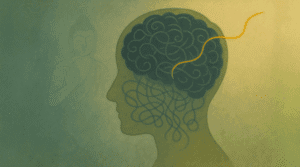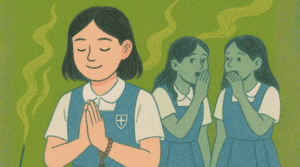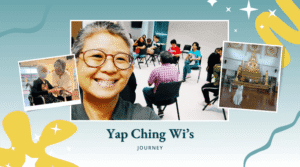About Our Guests
Venerable Thubten Damcho is a Buddhist nun residing at Sravasti Abbey, one of the first Tibetan Buddhist training monasteries in the United States. Born and raised in Singapore, she graduated from Princeton University in 2006 and worked as a high school teacher and public policy analyst in the Singapore government before returning to the U.S. to take novice ordination in 2013. She tells her story in The Straits Times Singapore.
Venerable Damcho’s monastic life is rich and varied. She serves as assistant to Sravasti Abbey’s founder, author and well-known Buddhist teacher Venerable Thubten Chodron. Her other responsibilities range from translating Chinese texts into English to removing weeds from Abbey’s 300-acre property. Venerable Damcho has given Dharma talks in Spokane, Idaho, California, India, and Singapore. She was the Chinese-English interpreter at a full ordination program in Taiwan in 2019, and has studied Tibetan through Maitripa College and with other teachers since 2017.
—-
Guest Host Wilson Ng:
Navigating the uncertain waters of love and lust while learning to accept his sexuality, Wilson has learnt a lot from the mistakes made. He is learning to accept himself for his attachment to lust and to see the inherently unsatisfactory nature of sex and lust.
[00:00:00] Cheryl:
Welcome to the Handful of Leaves bonus episode. My name is Cheryl, your co-host for this episode. In this episode with Venerable Damcho, we will still be talking about sex, but this time it will be the questions that you asked, you rated, and we will get them answered. We cover topics like masturbation, lustful thoughts, monastics’ relationship with their desires, as well as two other questions. So buckle in and enjoy this episode.
[00:00:32] Cheryl:
So the first question is, what does Buddhism say about masturbation for lay people?
[00:00:39] Venerable Damcho:
You know in reflecting on some of these fire round questions, right? It’s very tricky, like people come to a monastic hoping you will make some kind of moral pronouncement, right? Can do, cannot do. Venerable so-and-so says can do. That’s never a helpful position to be in. I’ve seen Venerable Chodron deal with it very skillfully to remind people the purpose of the teachings is for you to work out for yourself what is realistic or beneficial.
So I don’t know if Buddhism says necessarily anything about masturbation per se, if you’re asking for a scriptural reference? That I’m not familiar with. But you can logically work it out for yourself, right? Like what does this do to your body and mind? But, I think this applies to this whole thing of, how does it make you relate to your body? Yeah. What is the effect of that? And it’s gonna be different for different people, you know? Is this helping your mind or not, does this increase your attachment or not? And what’s the effect of that?
So it’s you having to work that out yourself. So I would always come back to that principle for any of these things, like what are you conceptualizing and is it actually true or not true? And is it helpful or not?
[00:01:50] Cheryl:
And I really like how you do not give like a clear yes no answer, but rather questions for people to think about. And I guess that helps them to meet themselves where they’re at as well because[00:02:00] strict yes or no, it just doesn’t work for anybody. Everyone has to, you know, come to the conclusion themselves and fit, I guess, where there are they are in practice as well.
[00:02:08] Venerable Damcho:
Yeah. And maybe people will say, that’s very irresponsible of me as a monastic. I don’t know. Like I’m supposed to give some kind of clear moral pronouncement. But you know, it has to come from you right?
And I do trust that people don’t wanna harm people. Fundamentally. Yeah. Or that, on the basis of suffering or wrong thinking that we harm others. Yeah. So in the long run, you know, work it out. If it’s using up too much of your time or it’s causing you a lot of stress and unrealistic views of self and others, or, you wind up spending hours on porn to do this kind of thing. It’s like, what are you doing with your human life? It’s so precious we don’t have that much time, you know?
[00:02:46] Wilson:
How do monastics relate to their body, or how do they relate to sexual desire? Because desire don’t just magically vanish overnight.
[00:02:55] Venerable Damcho:
Yeah, so in the early years, still now too, we have to keep doing meditation on the nature of the body. So that’s described at length by the Buddha, and there are many ways to do it. So as a monastic, you’ve already thought this through and you’re like, well, you know, I don’t see the benefit of having a lay relationship. I want to focus on spiritual practice. But as you said, all your old conditioning is still there. So these meditations are taught in that context to help you to calm that attachment down and to start seeing the body for what it is, right? So you break it up into parts and you analyze. What is this thing?
Is it as beautiful and pleasurable as I’ve been taught it is? Then you think about what happens to it. It decomposes and so on. And we do this repeatedly. Every year we do a “Exploring Monastic Life” program. We talk about our views and how they’re changing. And then if you need help, you have a mentor who helps you. You’re like, I have a lot of attachment come up. I just need someone else to know this so that I have support to work with it, you know? So it’s not a judgmental environment at all. We know this is what comes up as ordinary sentient beings. Or you can say, oh, I find I’m attracted to someone in the group. I have [00:04:00] to make sure that I don’t get into a situation where this could come up because I want to commit to a monastic way of life. And the community will support you with that. It’s not like, how could you, you have this thought, you must leave now. That’s never the case. Yeah. It’s like, oh, this person is sincere in their training, they came forward to say, I’m working with this. How do we help each other?
[00:04:20] Cheryl:
It is amazing. It’s like how the Buddha always said, spiritual friendship is not half of the path it’s the whole of the path. And just seeing this support to help each other through our sufferings present in the monastic community is wonderful.
[00:04:34] Venerable Damcho:
That’s a whole separate topic about this whole spiritual friend thing. But, I wanna say, you know, as Dhamma friends to each other, even as lay people, right? That’s how we relate, that’s how we help each other as friends. You’re helping someone with their afflictions. You’re trying not to feed them. So, if you have a friend who’s harming themselves or others or having unhealthy relationships, we have to have the courage and skill to find a way to talk about it with them, right? Not in a judgmental, angry way, but to say, Hmm, you know, I noticed you’re in a committed relationship and I noticed that you seem to be developing a relationship with someone outside of that this is going to harm your partner. This is harmful. I just want to raise that as your friend. I don’t want you to see this happen.
I mean, that’s very real, right? I’ve been in that situation and you can’t come to your friend and be like, you’re so bad. It’s like, hey, why are you dating people who are not available to you emotionally? You deserve better. That’s my skillful means. Yeah. I feel that’s important as friends, that we help each other that way as opposed to like, oh yeah, just do what you want. Go ahead.
[00:05:38] Wilson:
Yeah, I’m very appreciative to Cheryl because when I was having those lustful thoughts in the monastery, I texted Cheryl, I was like, Cheryl, how I’m struggling with lust, and she brought me back to Dhamma. Like you mentioned about the contemplation of the body, she was like, Wilson, are you sure you want all these? They are going to decompose! I’m glad I found the right person. And like you said, it’s a skillful manner. She didn’t do it in a way where I felt judged. It’s really like concern for a friend, how can you do better? How can you be better? So that was really nice.
[00:06:07] Cheryl:
I was just mass spamming him like articles about how the body decomposes, the stages of decomposition. Okay, on to our last question is how to deal with lustful thoughts towards an attractive person when I’m already in a relationship?
[00:06:22] Venerable Damcho:
So same things, you know, to even recognize that is the first step. That’s good. You’re not acting on it. And then you gotta ask yourself what is happening behind those thoughts? Are you exaggerating the attractiveness of someone else, something else? I think often if you’re in a committed relationship and attachment to someone else arise, there’s a lot going on there. Why are you dissatisfied with the current relationship?
Are there things you are avoiding talking about to your partner, that you feel you can’t maybe be honest or fully yourself in the existing relationship and you’re imagining some other human is going to be the solution, right? I think that’s how it works. First of all, there’s you and the existing relationship. Some kind of need is not being met there but you are unable to walk away or talk about it or work it out, and then you go project that on another human being thinking that they will solve your problem.
And you gotta ask yourself, is that true or not? Like, why can’t you work it out with the person you’re with first before you move on? Is it fair to that other person? You have this problem and you’re just gonna project it on another one and rope them in. Like, please think about this first okay? Yeah, and there’s some super long ranging consequences to this. It’s a giant mess. This is what causes people to kill each other. Jealousy, you know, they’ll never speak to you again, they sue you. It could get really ugly.
So, you know, before you imagine that some other human being is gonna solve your unmet need in an existing relationship, please think twice and to think deeply, is this a need I can meet for myself maybe, right? And then, yeah, of course you gotta take care of the person you’re in the relationship with.
Why has it come to the point where you don’t care about their feelings? What’s going on there? There’s aversion, I think, right? Or hurt or whatever it is. It’s come to the point where you’re like, I wanna look out of it. So often I think when there’s that kind of looking out of the relationship there’s a lot of escapism happening. You’re not wanting to actually confront what’s happening with yourself and to be kind and fair to the person you’ve been with for a while. So you gotta think very deeply before you break that trust. Yeah, there all kinds of consequences.
[00:08:36] Cheryl:
This hits so deeply. Because a lot of times, when we are in a relationship, it almost seems as though it’s the easiest solution to just find someone else to replace or even to prove something, right? Like if you’re in a relationship and the person doesn’t give you attention, you’re like, I’m still good enough if another person likes me. Or like, how can I get back at you by cheating on you?
Yeah, it hits very deeply because it’s a lot of emotions. I think cheating is not as simple as oh, I’m just lustful. But it’s just a whole baggage of things coming with it as well.
[00:09:08] Venerable Damcho:
Yeah, it just comes back to what we’ve been talking about today, right? It’s all the conceptualization, the emotion that comes with all this, and the first step it’s so important that we become aware of it in ourselves. And to ask ourselves with our own wisdom, what’s realistic, what’s beneficial, what is useful and caring and kind to others.
[00:09:31] Wilson:
So Venerable Damcho, are there any advice or any tips on this topic that we may not have covered in our discussion that you would like to bring up now?
[00:09:39] Venerable Damcho:
Actually, I know there was one question from someone who thought there were asexual. I mean, just on this topic of self-awareness, I think it’s so important to also be aware of the conditioning and the social pressure we face, and as we work out that process to be comfortable with where we are in relationship to our sexuality or gender and things like that.
So you have to sort out the whole baggage from others and then within yourself too. And I say this because, just reading this question, there seems to be so much pressure to define ourselves as sexual beings. And so for some people, this just doesn’t work that way. And to be comfortable with that, to be able to respect that in each other.
Even to identify, oh, I am a gay person, right? But people relate to that label so differently too. I’ve had gay friends who are like, out and proud, and this is who I am, and I’m an activist. And then I have friends who are like, hey, I want to be known as a human being first before the label, so can you relate to me that way?
And I’m like, this applies across all humanity, really. Seeing and hearing people for who they are. So, there’s so much pressure on young people to identify or to express sexuality a certain way. I remember in secondary school, people were like you don’t like boys, you don’t like girls. Are you a plant? I’m just not expressing in the way you want me to, I guess?
It’s like there are other things that are important to me right now. I’m not crazy about dating right now, you know, it’s just not part of my life right now. That’s okay. Yeah. So whoever asked this question, be clear about that. Yeah. Before we identify or solidify an identity around some aspect of our being, remember, we are multifaceted, very complex beings.
[00:11:22] Wilson:
It’s really just one aspect of us, but sometimes I guess there’s too much focus on that, that causes us to overlook the other aspects. And I really like the part that you mentioned just to relate to him or to them like a human being because, I have been told multiple times by some of my friends that I come out at the most unexpected moments where it’s like out of nowhere. You’re just crossing the road with me, we’re carrying an umbrella together and you just suddenly come out to me. It’s like, can you choose a less dangerous timing?
And then after a while they realize that I told them that, it’s just like anything I tell you or any aspect about my life. It’s just something very normal. And the fact that I tell you about my sexuality, it doesn’t change anything. It’s just one aspect of me. You don’t have to see me any differently. I don’t have to act any differently. It helps to make me feel, I guess, a bit more authentic, that I don’t have to hide this certain aspect from you and that’s it. I just wanted to maybe also prove a point that by me telling you about it, it doesn’t change anything. It’s really just another aspect of my life that don’t need any special attention.
[00:12:23] Venerable Damcho:
Right. And that’s how you hold your identity. And it’s gonna be different for different people. Yeah. To hold each other with respect and care in that way.
Cheryl:
And with that, we come to the end of this fire round episode. I hope you enjoy and learn something. For me, the takeaway is that there’s no right or wrong or yes or no answers, but really using these guiding principles to help us to show up in respectful, caring ways to ourselves as well as the people that we are in intimate relationships with.
And as usual, if you enjoyed this episode, feel free to give us five stars on Spotify and share it with a friend, and of course, stay happy and wise till we meet again. Thank you.




